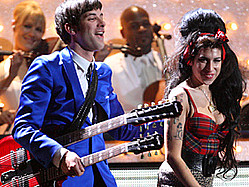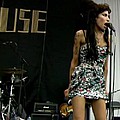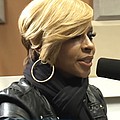Last year, when Mark Ronson was in New York doing press for his upcoming Record Collection album, he couldn't avoid questions about Amy Winehouse and her long-in-the-works follow-up to 2006's Back to Black album.
But to his credit, Ronson happily answered each and every one and, in the process, had a moment to reflect on not only the success of Black, but on the rather seismic shift it created in pop music. Of course, in the wake of Winehouse's death on Saturday, Ronson's words took on newfound meaning. Because no matter how Winehouse is remembered, her music will always be her lasting legacy.
"I am really proud of the sound of Amy's record, and, it's hard to remember, but before that came out, there was nothing else really on the radio that sounded like it," Ronson told MTV Radio in August 2010. "And then it kind of influenced things and became quite regular to hear something that would sound like that. I don't think there's anything that was as good as it, or as raw as Amy's vocals and her songs."
Ronson also spoke about how the duo planned on following up Back to Black, pointing to a then recent session he had just completed with Winehouse — a cover of Lesley Gore's "It's My Party" that appeared on Quincy Jones' Q: Soul Bossa Nostra album — as a possible hint at things to come. And despite the fact that he had spent most of his time trying to distance himself from the crackling retro leanings of Black, he knew that, when he worked with Winehouse, the best way to proceed was to keep things simple.
"If Amy's record had sold 300,000 copies and mine had sold 100,000 as opposed to significantly more than that, we'd probably both be quite happy coasting along doing the same sound. ... [A]nd that's a sound that I'm genuinely fond of; but the fact that it did get so big sort of forced me to change it up," he said. "But who knows, because Amy and I recorded a song quite recently for this Quincy Jones tribute record; we did a cover of Lesley Gore, and there was no point in dragging my Roland synths into an Amy Winehouse session. There's a kind of production arrangement that supports her voice. ... And after coming off my record, where the main edict was 'No covers, no horns,' to go back and cover a Lesley Gore song with the Dap-Kings and Amy felt like regressing a bit, but it wasn't, because it just sounds good and that's what she's supposed to sound like."
Ronson also talked about the expectations Winehouse was facing with the follow-up to Black, expectations he thought were impossible to manage. And, in doing so, he struck a tone that seems eerily prescient in retrospect.
"First of all, we're in a situation where the record industry basically loses about 10 percent in sales every year, so she's five years between records, and if you're talking numbers-wise, then no, [she] probably [won't sell as many records]," he said. "But I still think she's fully capable of writing another batch of brilliant songs and making a great record, and hopefully Salaam [Remi] and I will be involved in it because I think we all made a great record together last time. But you can never really count on anything being a given, so we'll see."










